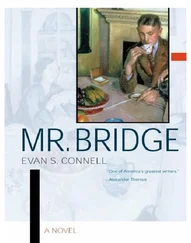It was quite a while before Mr. Bridge came downstairs to join the conversation; lie had recognized the voices and was in no hurry. Then, for about three hours, they sat in the living room with the pot of tea. Mrs. Bridge, w r ho was afraid her husband might walk out of the room and go back to bed, attempted to keep the conversation going; she also tried to get them to play a horse-racing game which w T as quite popular, and then she suggested cards. Wilhelm had a better idea; he thought he might tackle Mr. Bridge for a round of dominoes. How r ever there w r ere no dominoes in the house. Wilhelm suggested chess; there was no chess set. For a moment it looked as though Wilhelm might drive home to get his own chess set. Finally Mrs. Bridge got him off this subject. Presently he asked their opinion of the ballet troupe that had just completed an engagement in Kansas City.
“Oh, goodness/’ she said quickly, “now let me see the ballet yes, it was in town, wasn’t it, because Grace Barron called “
“I found the interpretation of the premier danseur rather too old-fashioned,” said Wilhelm, tapping his fingertips and frowning, “Although Susan, if memory serves, thought not, especially the ‘Swan Lake/ We both enjoy ‘Swan Lake.’ ” He also inquired if Mrs. Bridge agreed with the criticism of Kafka in the latest issue of a literary review.
“I’m afraid I missed that altogether/’ she replied. She had never heard of the magazine.
And eventually, inevitably, the conversation turned upon engineering because Wilhelm had been an engineer for thirty years. In spite of his experience, he said, “I have found it inexpedient to rely on memory. I place my faith in instruments. You may or may not, India, be familiar with the log-log duplex decitrix/’ He paused, lifting his bushy white eyebrows.
“I’m afraid I’m not,” she said.
“Well, since you are not an engineer that Is excusable/’ he
said, chuckling. “But I can tell you that In a tight spot there is nothing to help a man out like the duplex decltrix.”
Mrs. Bridge replied that It sounded dreadfully complicated, and later, as they were leaving, said she hoped they would stop by again before long.
50. Sir William and Sir Thomas
The Van Metres had a disconcerting habit of believing what people said. Mrs. Bridge, having expressed the hope they would stop by again, forgot about them. Yet two weeks had not passed before they came for another nice little visit. She pretended to be glad to see them. They drank several pots of tea and seemed not to be aware of the long periods of silence. Mrs. Bridge desperately tried to prevent silences, and ordinarily she succeeded, but with the Van Metres it was an awful job. She was grateful when either of them began to speak because it gave her a moment to rest and to think of another topic. Susan very seldom had a word to offer; Wilhelm would be lost in thought for half an hour, after which he might take the next half hour to tell an anecdote. On this occasion he took very nearly that long to relate a tale about two sixteenth-century gentlemen: Sir William Roper and the lord chancellor of England whose name was Sir Thomas More. It seems that Sir William came calling on Sir Thomas with a proposal to marry one of his daughters.
Sir Thomas, being agreeable to this Idea, led Sir William to the bedside of his daughters and whipped off the covers. The two girls were lying on their backs with their smocks up as high as their armpits. They at once rolled over on their bellies. Sir William said, “I have seen both sides.” He then patted one of the girls on the buttocks, and said, “Thou art mine.”
“Well,” observed Mrs. Bridge the moment the story ended, “I’m certainly thankful times have changed.”
51. The Low-pressure Salesman
A few days after this visit with the Van Metres another old acquaintance turned up. Mrs. Bridge was in the breakfast room wondering what to do how to occupy herself till noon when Harriet entered to say there was a man at the back door.
“What does he want?*”
“That’s what I asked him, and he wouldn’t say.”
“Didn’t he give his name?”
“No name,” said Harriet, “and he looks suspicious/*
Everyone looked suspicious to Harriet. Mrs. Bridge, after a moment of thought, got up and walked through the kitchen to the back door. It was snowing outside, and on the back step was a stoop-shouldered little man with a woeful expression who was shivering uncontrollably and stamping his feet. On seeing her he attempted a smile and his mouth formed the word “Hello.” Mrs. Bridge could not think where she had seen him; then she remembered the art Instructor In whose evening class she had done some painting. Opening the door, but leaving the glass storm door locked, she said, “Why, it’s Mr. Gadbury!” For some reason he did look suspicious, and more lost and defeated than In his studio. He was attempting to speak; his words were Inaudible through the storm door. Mrs. Bridge, conscious of Harriet’s premonition, despite the familiarity of it, was therefore reluctant to let him In.
“Is there anything I can do for you?” she inquired.
A flurry of snow swept over him. He tried once more to smile. He was not a stranger, but on the other hand he was not exactly a friend who had come calling. He did not appear to have been drinking, In spite of his red nose, nor did he look violent; so she disregarded Harriet who was standing with her arms crossed, emphatically shaking her head and unlocked the door.
**Won’t you step in y Mr. Gadbury? It must be cold out there.”
Gadbury stepped In. His teeth were clattering and he walked with difficulty. He looked as though he had been out in the snow for hours. He followed her into the living room with his hat in his hands, glancing behind to see if he was leaving tracks on the carpet, and he was. She invited him to sit down. He did so, and finding no place to put his wet hat he hung It on his knee. He shivered constantly. He had turned a mottled yellow and grayish-blue color like a piece of sausage that had been in the refrigerator for several weeks, with the exception of his moist red nose. He twitched and jerked and did not seem to be breathing. He made no attempt to speak. His chin was tucked into his collar, his knees knocked together, and his feet occasionally sprang off the floor of their own accord.
Mrs. Bridge, having observed him, said, “I’m going to have Harriet fix you some hot tea/’ She got up and walked across the room to the bell pull. The bell pull was a strip of material about eight feet long, resembling a sample of Persian rug, which was suspended from a lever near the ceiling. It hung down against the wall alongside the highboy. It was actually simpler to step into the kitchen and speak directly to Harriet, but whenever there were guests Mrs. Bridge used the bell pull. She took hold of it about tw T o feet from the bottom and gave a slow, gentle tug; she could never quite get over the feeling that someday w r hen the room was full of people she would pull it and it would fall down around her neck like a Catholic chasuble. Presently Harriet appeared, looking overly insouciant, as though she suspected an intrigue.
“I believe we would like some tea,” said Mrs. Bridge.
She then returned to her chair and waited for Mr. Gadbury to speak, but he made no effort to do so. He continued to twitch and shiver. She heartily wished he would think of some way to stop his teeth from chattering.
Finding that she was observing him, Gadbury drew a handkerchief from the pocket of his coat and weakly blew his nose, and said, “I’m pretty cold.”
“I’m sure you must be,” replied Mrs. Bridge. “The paper says it got down to zero at six o’clock this morning/*
Читать дальше












